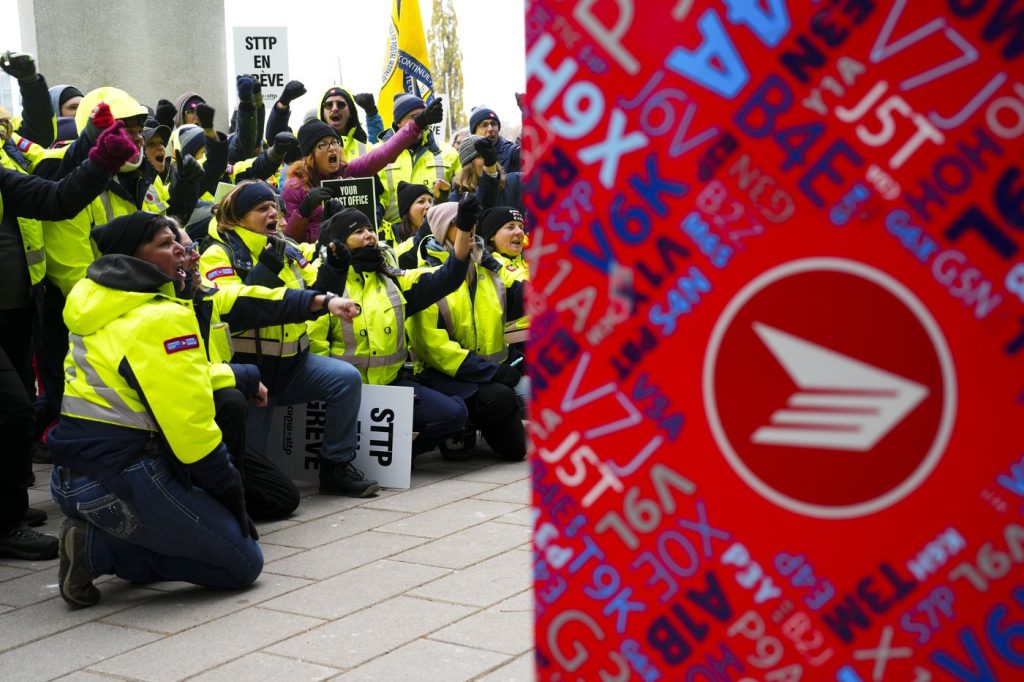Federal government asks labour board to intervene in Canada Post strike

Posted December 13, 2024 3:16 am.
Last Updated December 13, 2024 12:31 pm.
The federal labour minister has decided to intervene in the Canada Post strike, now on its 29th day.
Steven MacKinnon says the Crown Corporation and the Canadian Union of Postal Workers (CUPW) are at an impasse after a nearly month-long work stoppage, and negotiations are going in the wrong direction.
The labour minister has referred the dispute to the Canada Industrial Relations Board, with the aim of ordering the nearly 55,000 workers back to work as early as Monday and extending the current collective agreement until May 22, 2025 – if the board determines a deal isn’t within immediate reach.
MacKinnon says people across Canada – especially small businesses, people in remote communities, and Indigenous people – have suffered due to the strike. He’s asked the board to make a decision quickly and hopes the mail will be delivered again starting next week.
In the meantime, MacKinnon said he will appoint an industrial inquiry commission to look into the bargaining issues and come up with recommendations by May 15 on how a new agreement can be reached.
MacKinnon previously rebuffed calls for Ottawa to intervene, saying it was up to the two sides to negotiate a deal.
“We’re calling a time out,” MacKinnon told reporters today at a press conference in Ottawa.
“Suffice to say positions appeared to have hardened and it became clear to me we were in a total impasse.”
A federally-appointed mediator withdrew themselves two weeks ago, saying at the time the two sides were too far apart to make a deal.
MacKinnon said since then, the negotiations have been “going in the wrong direction.”
MacKinnon called the decision a creative solution by not sending the matter directly to binding arbitration — as the government did in recent labour disputes with Canada’s railways and ports.
He said this doesn’t mean a deal will be automatically in reach by May, but hopes the inquiry can show a path forward that works for both Canada Post and its workforce.
“There are major structural changes in that industry that have to be accounted for,” he said.
“There are workers aspirations in that industry that have to be accounted for. Those have proved to be interests that are tough to reconcile. So I’m looking to try and triage those issues.”
A CUPW spokesperson denounced the government’s decision, calling it an assault “on our constitutionally protected right to collectively bargain and to strike.”
“This order continues a deeply troubling pattern in which the government uses its arbitrary powers to let employers off the hook, drag their feet, and refuse to bargain in good faith with workers and their unions,” the union representative said. “What we do know is that postal workers are being forced to return to work without new negotiated collective agreements in place.”
This week, we saw a resolution on one thing: a labour practice complaint from CUPW over layoffs during the strike. The union said a mediated settlement was reached that requires Canada Post to notify affected employees that they are not on a temporary layoff.
The Canadian Federation of Independent Business however welcomed the move. It estimates small businesses have been losing a combined $100 million every day.
“This will be too late to salvage any of the Christmas holiday season for small businesses,” CFIB president Dan Kelly said in a statement.
“With a massive backlog, it will be nearly impossible for any new shipments to make it to Canadians before Christmas through Canada Post.”
Kelly said the resumption of mail will help businesses waiting for cheque payments from customers. Such a hold on payments, he said, have made it hard for small businesses to pay their bills.
The key issues in the strike by more than 55,000 workers include wages, job security and how to staff a proposed expansion into weekend delivery.
Canada Post’s operations operations continue to be disrupted by the national strike. Mail and parcels are not being delivered presently, but some post offices remain open and offer limited services.
Once operations resume, Canada Post said all mail will be delivered as quickly as possible on a first-in, first-out basis.
MacKinnon said there are 50,000 permanent resident cards yet to be mailed, 190,000 passports, and the Canada Revenue Agency is holding more than 1.65 million pieces of secure correspondence.








